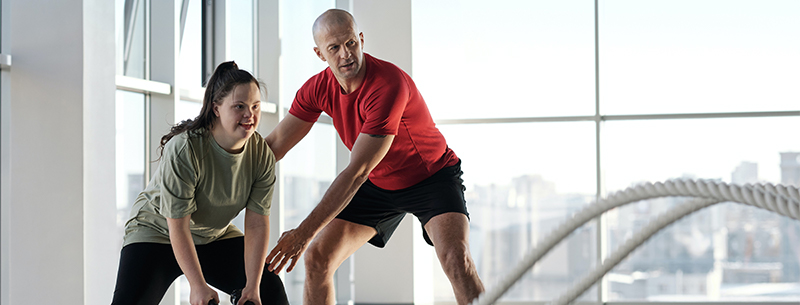Keeping your body moving is important for maintaining muscle conditioning and overall good health.
Exercise physiology is an allied health service that uses exercise and movement to improve fitness, build strength and manage chronic disease.
It’s one of the lesser known allied health services so we thought we’d explore the role of exercise physiologists and how they can help people with a disability live a healthier life.
What is an exercise physiologist?
An exercise physiologist is a university qualified health professional who can assess your overall fitness, health and wellness and identify activities or lifestyle changes to support you to reach your goals.
Whether you want to become more active, lose weight, increase movement or improve balance, an exercise physiologist can help.
An exercise physiologist can:
- Design a fitness program just for you based on your goals and what you like doing
- Offer advice on lifestyle modifications for better health
- Help you achieve your fitness goals
- Assist you to prepare for other activities such as community or team sports, or attending a gym
- Ensure you are moving in a way that is safe and won’t make existing conditions or pain worse.
Types of clients exercise physiologists work with.
Exercise physiologists can treat a wide range of conditions including:
- Multiple sclerosis
- Intellectual disability
- Physical disability
- Muscular dystrophy
- Stroke
- Spinal cord injury
- Cerebral palsy
- Chronic pain.
Everyone is different so the type of program an exercise physiologist develops for you will be based on your individual needs and aims.
What to expect from an exercise physiologist.
When you visit an exercise physiologist, it is likely they will do an assessment. This will look at things like:
- How you move
- Your posture and balance
- Fitness and strength
- Respiratory and cardiovascular fitness
- Diet and lifestyle
- Current medications
- Any limiting factors such as physical disabilities, injuries or pain.
They might also ask you to complete a questionnaire about your health history (if you have the Leap in! app, you can invite them as a member of your Crew so you don’t have to share your story again).
The exercise physiologist will use this information to develop a program which might include group or private fitness sessions, exercises to practice at home or lifting weights. You may also be given diet, nutrition or lifestyle advice and be supported to make changes that will help you achieve your goals.
Exercise physiology and the NDIS.
You’re most likely to need exercise physiology services as part of your NDIS Plan if:
- Your goals relate to moving more independently, building strength, participating in community sports or improving fitness
- You are at risk of developing or have an existing condition that impairs physical movement
- Your disability makes it hard to maintain good health or a healthy weight.
Remember the NDIS will only fund supports that are considered “reasonable and necessary” so don’t forget to spend some time setting your goals ahead of your NDIS Plan meeting to ensure you get the supports you need in your next plan.
Funding for exercise physiology will come from 1 of 2 budget areas in your NDIS Plan:
- Capacity building – Improved Daily Living
- Capacity building – Improved Health and Wellbeing.
Finding a provider.
The Leap in! Provider Network Directory makes it easy to find providers of supports and services related to your NDIS Plan – including exercise physiologists!
Filter by condition, location or service type and send an enquiry direct from our website.You can access the directory at https://www.leapin.com.au/provider-network-directory/
Further reading
What is capacity building (and how can it help build independence)?

